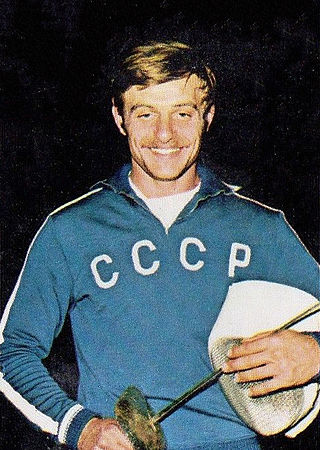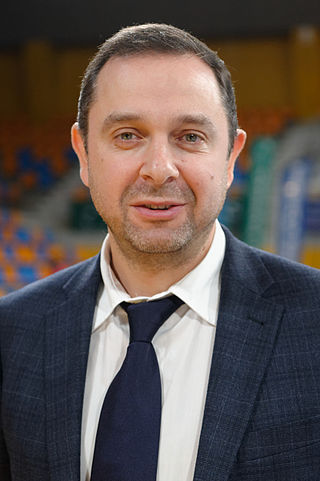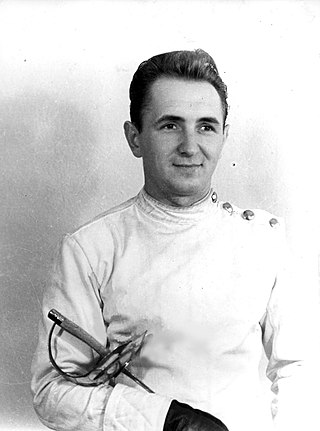Allan S. Kwartler, born in New York City, was an American sabre and foil fencer. He was Pan-American sabre champion, 3-time Olympian, and twice a member of sabre teams that earned 4th-place in Olympic Games.

Viktor Alexandrovich Sidyak is a Russian former left-handed sabre fencer, a pupil of Mark Rakita and David Tyshler. He was known for his aggressive style and the "one-and-a-half tempo attack".
Aleksey Frosin is a Russian fencer who won a gold medal in the team sabre competition at the 2000 Summer Olympics in Sydney together with Aleksey Dyachenko, Stanislav Pozdnyakov, and Sergey Sharikov. He won the bronze medal in the individual and team sabre (together with Nikolay Kovalev, Stanislav Pozdnyakov, and Aleksey Yakimenko at the 2006 World Fencing Championships.
Mark Semenovich Rakita is a famed Russian two-time Olympic champion sabreur and coach from the Soviet era.

The Soviet Union (USSR) competed at the 1968 Summer Olympics in Mexico City. 312 competitors, 246 men and 66 women, took part in 164 events in 18 sports.
Mark Petrovich Midler was a Soviet Russian foil fencer. He competed at four Olympic Games, at which he won two gold medals.

János Garay was a Jewish Hungarian fencer, and one of the best sabre fencers in the world in the 1920s. Gaining international recognition in Olympic sabre competition, he distinguished himself winning a gold medal in 1928 in Amsterdam, and a silver and bronze medal in 1924 in Paris.
Eduard Teodorovich Vinokurov was a Soviet Russian Olympic champion and world champion sabre fencer.
Sergey Aleksandrovich Sharikov, also known as Serguei/Sergei Charikov, was a left-handed Russian Olympic champion sabre fencer. In the Olympics he won two gold medals, a silver medal, and a bronze medal.
Yakov Anufrievich Rylsky was an Olympic champion and three-time world champion Russian sabre fencer who competed for the Soviet Union. He took part in three Olympic Games and won two medals in the team events.
Viktor Alekseyevich Krovopuskov is a retired sabre fencer, who competed for the USSR.

Vadym Gutzeit is a Ukrainian Olympic champion sabre fencer, and former Ukraine's Youth and Sport Minister, as well as the president of the Ukrainian Fencing Federation and the President of the National Olympic Committee of Ukraine.

The men's sabre was one of eight fencing events on the fencing at the 1968 Summer Olympics programme. It was the sixteenth appearance of the event. The competition was held from 16 to 17 October 1968. 40 fencers from 16 nations competed. Nations had been limited to three fencers each since 1928. The event was won by Jerzy Pawłowski of Poland, breaking a nine-Games string of Hungarian victories in the event. Hungary's best result in the event was Tibor Pézsa's bronze; Pézsa beat Pawłowski in the final pool but the Hungarian lost two other bouts while the Pole was otherwise flawless. Mark Rakita of the Soviet Union lost only to Pawłowski in the final pool, forcing another bout to break the tie between them for gold and silver; that barrage bout was decided by a single point as Pawłowski beat Rakita 5–4.
Mikhail Ivanovich Burtsev was a Soviet sabre fencer. He won two gold medals and two silvers at three different Olympic Games.

The men's sabre was one of eight fencing events on the fencing at the 1980 Summer Olympics programme. It was the nineteenth appearance of the event. The competition was held from 24 to 25 July 1980. 30 fencers from 12 nations competed. Nations had been limited to three fencers each since 1928. The event was won by defending champion Viktor Krovopuskov of the Soviet Union, the nation's third consecutive victory in the event. Krovopuskov was the third man to successfully defend a sabre title and the 10th man to win two medals of any color in the event. His teammate Mikhail Burtsev took silver. Imre Gedővári's bronze medal returned Hungary to the podium after a one-Games absence broke an eleven-Games streak.

The men's sabre was one of ten fencing events on the fencing at the 1996 Summer Olympics programme. It was the twenty-third appearance of the event. The competition was held on July 21, 1996. 43 fencers from 20 nations competed. Nations had been limited to three fencers each since 1928. The event was won by Stanislav Pozdnyakov, prevailing over silver medalist Sergey Sharikov in an all-Russia final. The medals were the first for Russia as an independent nation, separate from the Soviet Union, in the men's sabre. Damien Touya of France won the bronze medal bout, extending France's podium streak to four Games.

Eli Dershwitz is an American left-handed saber fencer, five-time individual Pan American champion, three-time Olympian, and the 2023 saber World Champion.
The USSR Fencing Federation was the national organisation for fencing in the USSR. It was affiliated with the International Fencing Federation (FIE) since 1952. The headquarters of the USSR Fencing Federation were in Moscow. The USSR Fencing Federation hosted the 1966 World Fencing Championships.






